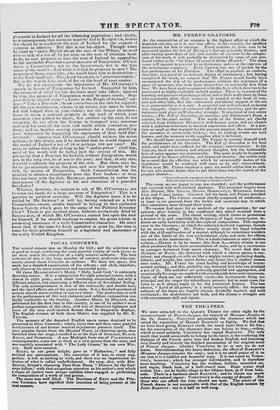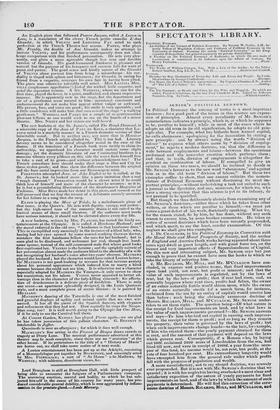THE THEATRES.
WE were attracted to the Queen's Theatre the other night by the announcement of Pauvre Jacques, the original of Monsieur Jacques at the St. James's; VIZENTINI personating the character which has raised the reputation of MORRIS Bsneerr so highly. We find that we have been giving BARNETT credit for much more than is his due ; for the conception of the character does not belong to him,—unless, which is most unlikely, VIZENTINI has copied BARNETT. The only merit that would seem really to belong to the latter, is the rendering the dialogue of the French piece into bad broken English, and imitating very closely and cleverly the finished personation of the original actor- of Pauvre Jacques : whether VIZENTINI be he or not, we do not know. Notwithstanding this heavy deduction, the effect of BAfteares Monsieur Jacques remains the same ; and it is no small praise of it to say that it is a faithful and beautiful copy. It is not equal to Value- net's, however; which has stronger individuality, and is therefore. more touching. VIZENTINI has the restless, listless, unsettled air, and vague, blank look, of a halacrazed man. Hope seems dead within him; yet he fondly clings to her lifeless form, as if from habi- tude. There is a hardness about BARNErr ; and be shows too much spleen and natural vigour: VIZENTINI'S is the energy of despair. But those who can afford the time should see both. The music of the French drama is not comparable with that of the English version by JOHN BARNETT : nor is it half so well sung. An English piece that followed Pauvre Jacques, called A Lesson in Love, is a translation of the clever French petite comedie L'Anii Grande. t ; In which VOLNY8 and LEONTINE FAY acted to such perfection at the French Theatie last season. PARRY, who plays .iffr.. Frankly, the double of Ami Grandee, makes no attempt to Imitate VOLN. Tf4; and his performance consequently does not chal-
lenge comparison with that finished personation. He acts very plea- tantly, and gives a more agreeable though less true and forcible version of Grandee. His good-humoured frankness is pleasant and
,natural, but the purpose of his brusquerie and sarcasm fails for want of point and power. The good sense and kindly nature of the Grandee of VOLNY8 alone prevent him from being a misanthrope : his cor- diality is tinged with spleen and bitterness; for Grandee, in saving his friend from a coquette, revenges his own fate in having been jilted. The piece was °them ise tolerably well acted. Miss LAVINIA MEL- VILLE (euphonous appellation!) /oohed the wicked little coquette, and acted the repentant woman. A Mr. WORRELL, whom we saw for the first time, played the lover, in a quiet, unaffected, and almost impressive manner. He is apparently new to the stage, but the deportment and air of a gentleman seem natural to him : occasional constraint and embarrassment do not make him appear either vulgar or awkward. His person, face, and voice are good ; his smile is very agreeable ; and a little confidence will make him that rara arisof the stage "a walking gentleman." WORRELL and PARRY are a couple of as gentlemanlike pleasant fellows as one would wish to see on the boards of a minor theatre. Mrs. NISBET and her sisters are well beau'd.
The new burletta at the St. James's, called The Rough Diamond, is a miserable copy of the Jean of PAUL DE KOCK, a character that LA- FOND acted in a masterly manner in a French dramatic version of that inimitable novel. But in neither case, any more than in Monsieur Jacques, is the French origin alluded to. This is too bad. Literary larceny, seems to be considered altogether venial in the case of the drama. If the translator of a French book were tacitly to claim its authorship, we apprehend his character would sustain some slight damage; yet the dramatic literature of our Continental brethren is a museum whence every pilferer on this side the water feels himself free to take u cast of its gems—and without acknowledgment too ! The French comedians here should make their stage a Hue and Cry for these stolen goods; and thus show the difference between the original and the base metal impression from our Brummagem mint. FORRESTER attempted Jean, or John English as he is called, at the St. James's ; but he looked more like a paste imitation than a real "rough diamond." FORRESTER would be a clever actor if he could 'think less of himself and more of the character he assumes : as it is, he is but a perambulating illustration of the Gentleman's Magazine of Fashions. Miss REES made her debut in this piece, and seemed so far
• self.possessed that we fear the tremor of a debutante scarcely accounts for her failure in a song that she sang.
ELTON is playing the Moor of Toledo, in a melodramatic piece of that name, at the Queen's. He acts with dignity, energy, and pathos : but the high-raised tone of the romantic drama is not suited to the limited means of these small theatres. If the audience must needs have serious interest, it should not be elevated above every-day life.
A new burletta, written by Mrs. PLANCHE, has varied the lively en- -tertaintnents at the Olympic. It is called A Handsome Husband; and the moral enforced is the old one, "handsome is that handsome does." This is exemplified very amusingly in the instance of a blind lady, who, having had her eyes opened by some marvel-working German doctor, mistakes the first handsome fellow she sees for her husband ; but is soon glad to be disabused, and welcomes her real, though less hand- some spouse, instead of the self-enamoured male flirt whose good looks ‘first captivated her. VESTRIS is the heroine ; and the sprightly naiveté of her personation almost made the audience blind to the absurdity of a wife not recognizing her husband's voice after two years' absence. MATHEWS played the husband ; but the character would have suited Lisrola better ; for Matnews is too good-looking to account for that nervous anxiety about his personal appearance which induced him to marry a blind woman because she could not see him. It is otherwise not a character especially adapted for MATnews the Younger—it only serves to show his mannerism, not his talent. VINING never appeared to better ad- vantage than in the character of the lady-killing coxcomb : his affecta- tion of drunkenness is a delicate piece of dandyism. There is only one scene—an apartment splendidly designed, in the Louis Quatorze style, and a most complete piece of scenic illusion : it is painted by
HILLIARD.
MATHEWS'S dancing of the Tarantella is one of the most finished and graceful displays of agility and animal spirits that we ever wit- nessed. It has all the gusto of the Spanish dancers, with elegance and refinement that they had not. How capitally he sings the Neapo- litan song, too ! It is well worth going to the Olympic for One Hour, if it be only to see the Carnival ball there.
At Covent Garden, KEIlIsLE has played Pierre again—we are glad he has taken possession of this gallant character. G. BENNETT is intolerable in Jaffier.
Quasimodo is now an afterpiece ; for which it does well enough.
MACEEADY'S fine acting in the Provost of Bruges draws crowds to tragedy at Drury Lane. The musical performance advertised at this theatre may be made complete, since there are no " oratorios " at the other house. If its pretensions to the title of a " History of Music" are borne out, we shall take some notice of it next week.
A Lenten entertainment has been got up at the Adelphi, consisting of a Monopolylogue put together by BUCKSTONE, and amusingly acted by Mrs. Fizwituram; a sort of "At Home" 4-la-Mathews, by WEBSTER; with tableaux, dissolvent views, lize.



























 Previous page
Previous page